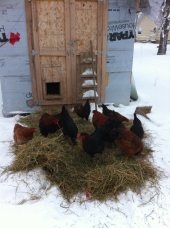
 9
9




 )
)
 10
10




 7
7




“Action on behalf of life transforms. Because the relationship between self and the world is reciprocal, it is not a question of first getting enlightened or saved and then acting. As we work to heal the earth, the earth heals us.” ~ Robin Wall Kimmerer
 5
5




"When the whole world is running towards a cliff, he who is running in the opposite direction appears to have lost his mind." C.S. Lewis
Visit https://themaineingredient.com for organic, premium dried culinary herbs that are grown, processed, and packaged in the USA.
 4
4




 7
7





 4
4




 8
8




Always be kind to animal, plant, and earth.
 6
6




 2
2




Nicholas Roberts wrote:I’m new to chickening. (I’m going to call it that, and no one can stop me
)
Anyway, I’m wondering what breeds would be recommended for a first-year chickener with very little experience.
I’m at 6000 ft, high desert/plains of AZ, and temperatures do reach 10 below zero F at times, though not often.
Temperature swings are pretty drastic between day and night, and the heat/sun in summer can be inclement as well.
I have a few ideas bouncing around in my head for a coop, but I’m wondering if there are certain breeds that would do better than others in this climate.
Also very interested in amending my very clay-rich, acidic soil, so not sure if chickens would be the best bet or not??
Any advice would be appreciated.
Happy chickening!
Zone 6b, dry, high desert in New Mexico 7500' elevation
have you checked your new USDA Hardiness zone? Check here: https://planthardiness.ars.usda.gov/
 3
3




 1
1





 2
2




Hans Albert Quistorff, LMT projects on permies Hans Massage Qberry Farm magnet therapy gmail hquistorff








 1
1




I make a Maple Syrup instructional movie! Check it out HERE
SKIP books, get 'em while they're hot!!! Skills to Inherit Property
See me in a movie building a massive wood staircase:Low Tech Lab Movie
 2
2











 2
2




Sadly that batch of seed was bad or the germination conditions got too dry or wet. In many cases though the grains I fed them that got scratched into the soil did sprout and produce food for them on the next round of movement. In my climate wheat is successful in almost all seasons so that is my choice of feed. The chicken tractors were inherited with the farm from my sister and were built as a 4-H project by youth she was mentoring. So at the time of the video were showing signs of weakness after 12 years of use. Recommend notching a 2x4 for the uprights instead of using 2 pieces of 2x2 . The wheels on the end are from a rusted out lawn mower and can be adjusted up and down to make it easier to move over distance. It needs to sit tight to the ground without gaps to keep predators out. And as mentioned chicken wire is not strong enough to keep racoons from breaking in as it starts to corrode over time.Nicholas Roberts wrote:Thanks Hans!
I love the design. Especially the roof. Simple and effective.
I’ll have to check more of your videos, but how did the amaranth do??
Hans Albert Quistorff, LMT projects on permies Hans Massage Qberry Farm magnet therapy gmail hquistorff








 We are planning to get our first chickens this spring, thinking maybe 3-5, but also unsure on breeds and I still have a lot of research to do. Our climate is quite different from yours (temperate hillside next to a forest, at the edge of floodplain and wetland) but similarly we will have to prepare to protect them from predators, as we have just about all of them here that would love to eat some chicken (cougars, bears, coyotes, eagles, etc.) I'm still slightly hesitant to get them, knowing that they could end up attracting predators to our yard, and we have a young kid and a couple of dogs... so that makes me nervous. I wonder what advice folks have about that?
We are planning to get our first chickens this spring, thinking maybe 3-5, but also unsure on breeds and I still have a lot of research to do. Our climate is quite different from yours (temperate hillside next to a forest, at the edge of floodplain and wetland) but similarly we will have to prepare to protect them from predators, as we have just about all of them here that would love to eat some chicken (cougars, bears, coyotes, eagles, etc.) I'm still slightly hesitant to get them, knowing that they could end up attracting predators to our yard, and we have a young kid and a couple of dogs... so that makes me nervous. I wonder what advice folks have about that?











Tara Swenson wrote:Hi Nicholas, fellow noob chickener here
We are planning to get our first chickens this spring, thinking maybe 3-5, but also unsure on breeds and I still have a lot of research to do. Our climate is quite different from yours (temperate hillside next to a forest, at the edge of floodplain and wetland) but similarly we will have to prepare to protect them from predators, as we have just about all of them here that would love to eat some chicken (cougars, bears, coyotes, eagles, etc.) I'm still slightly hesitant to get them, knowing that they could end up attracting predators to our yard, and we have a young kid and a couple of dogs... so that makes me nervous. I wonder what advice folks have about that?
Previously we had ducks when we lived in the city, in a very urban location, and one of them ended up getting killed (by a raccoon I think) while another got attacked by a possum (and managed to survive), so I guess predators are going to be an issue no matter where one is located.
Hans Albert Quistorff, LMT projects on permies Hans Massage Qberry Farm magnet therapy gmail hquistorff





|
A berm makes a great wind break. And we all like to break wind once in a while. Like this tiny ad:
Rocket Mass Heater Resources Wiki
https://permies.com/w/rmh-resources
|






